Key takeaways:
- Understanding and preparing thoroughly for auditions, including knowing your material and managing your mindset, enhances performance and reduces anxiety.
- Authenticity in monologue delivery stands out; connecting personally to the material and using vocal and physical techniques can elevate your performance.
- Learning from feedback and rejection is vital for growth as a performer; each experience can provide valuable insights for future auditions.
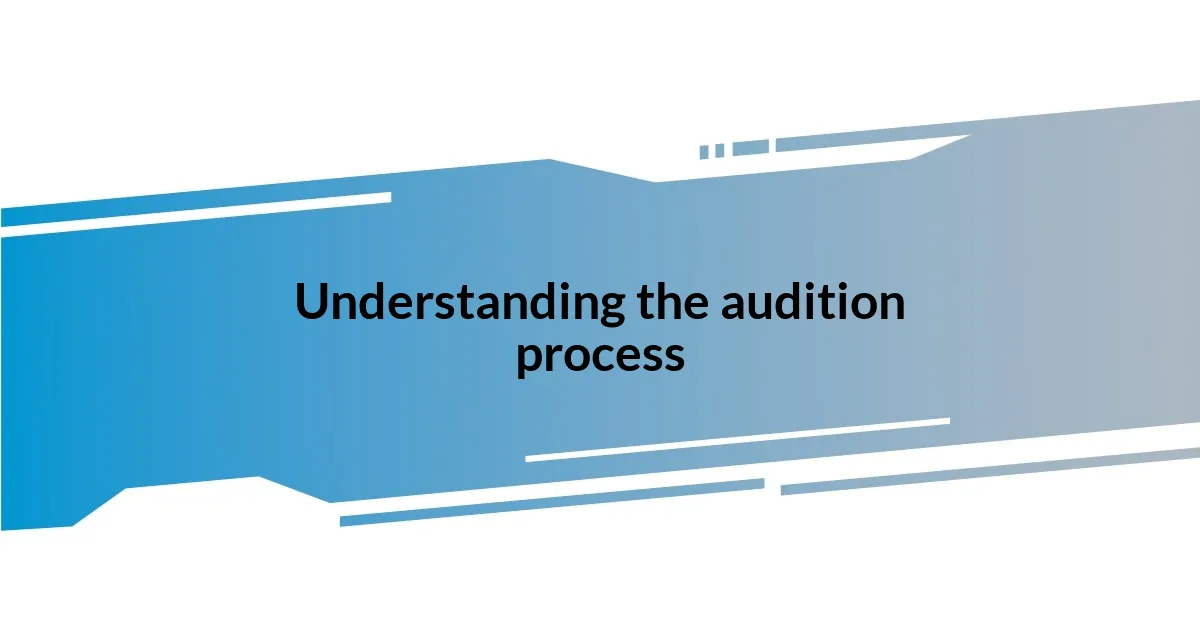
Understanding the audition process
Navigating the audition process can feel like stepping into a whirlwind. I remember one particular audition where the nerves overwhelmed me—I was ready, but still, the stakes felt incredibly high. Why do we put ourselves through this? It’s the drive to showcase our unique talents and connect with others that makes it worthwhile.
The audition landscape is diverse, with each call having its own set of expectations and requirements. Learning to read between the lines of a casting notice can be a game-changer. I once missed a crucial detail on a call sheet that led to an awkward moment in my preparation. Trust me, paying close attention to those subtle clues can save you a lot of embarrassment and effort.
Auditions aren’t just about proving your skills; they’re also an opportunity for self-discovery. Each time I step in front of a panel, I learn something new about my capabilities and limitations. Have you ever faced rejection? I have, and while it stings, it ultimately shapes us as performers. Each experience adds layers to our growth, helping us become more resilient and adaptable for future opportunities.
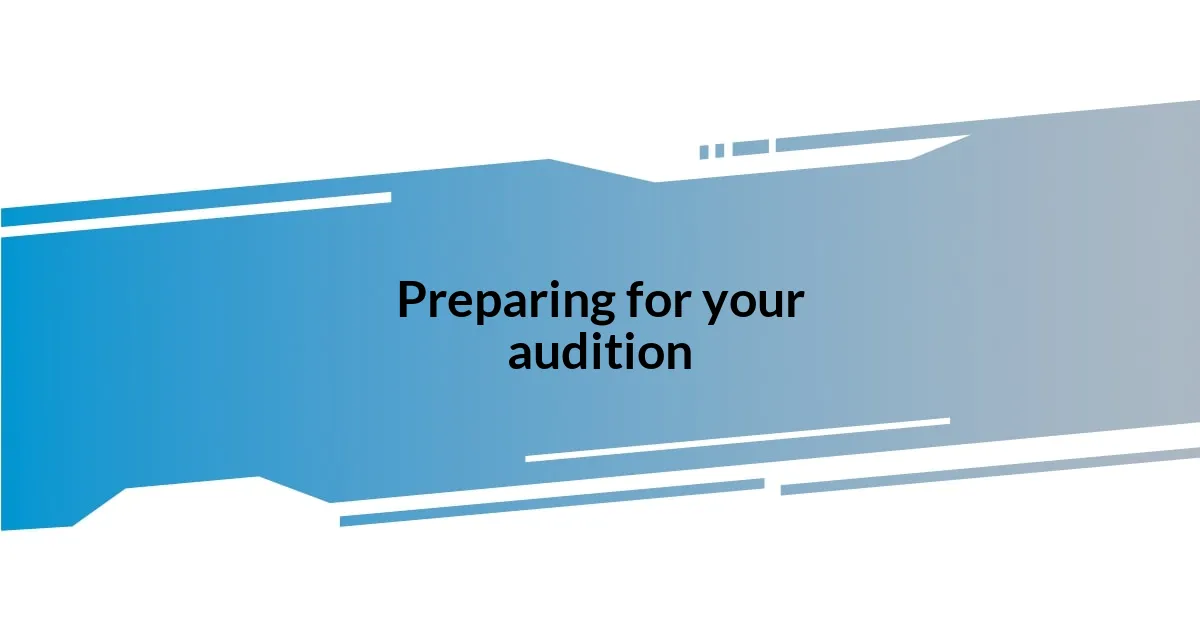
Preparing for your audition
As you prepare for an audition, my first piece of advice is to understand the material inside and out. I once had an audition where I mispronounced a key word in my monologue, and it felt like a weight on my chest the entire time. That taught me the importance of knowing my lines so well that I could perform them in my sleep—not just recite them confidently, but truly connect with the character.
Creating a rehearsal schedule can also significantly ease the pressure. I remember structuring my practice sessions around the most difficult parts of my piece, focusing on them until they began to feel natural. Breaking things down into manageable sections made all the difference, allowing me to approach the audition not as a daunting challenge, but as an opportunity to shine.
Lastly, consider your mindset going into the audition. Fear is a part of the process, but I’ve learned that channeling that energy into excitement can lead to a much more dynamic performance. One time, I stepped onto the stage feeling nervous yet invigorated; that shift in perspective transformed my whole approach and left a lasting impression on the judges. What about you? Have you found ways to shift your nerves into something positive?
| Preparation Strategy | Suggestions |
|---|---|
| Understand the Material | Know your lines thoroughly to build confidence. |
| Rehearse Regularly | Structure practice sessions to focus on challenging parts. |
| Mindset Shift | Transform anxiety into excitement for a dynamic performance. |
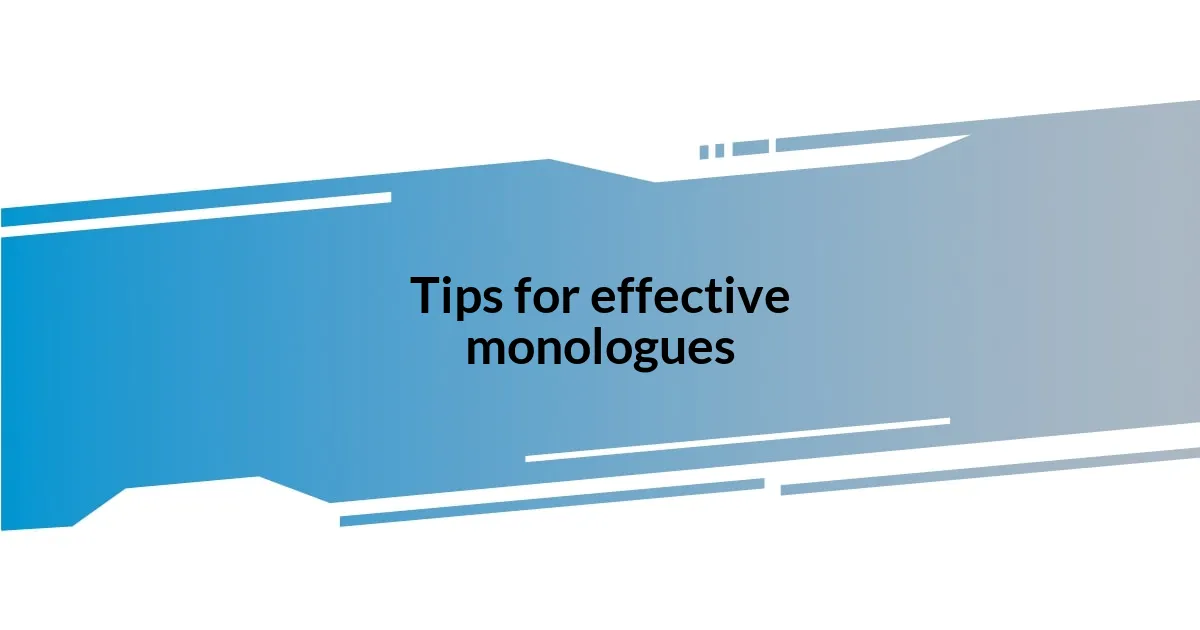
Tips for effective monologues
When it comes to delivering an effective monologue, I’ve discovered that authenticity truly stands out. I remember a time when I tried to mimic someone else’s performance because I thought it would impress the judges. It fell flat. What you bring to the piece has to be genuine; your interpretation should reflect your unique perspective. The moment I embraced my own voice was the moment my performances became more engaging and memorable.
Here are some tips to hone your monologue delivery:
- Connect Emotionally: Find a personal experience that resonates with the emotions in the script. Sharing that connection can intensify your performance.
- Physicality Matters: Consider your body language and gestures. I once rehearsed in front of a mirror to see how my physical presence conveyed the mood and themes of the piece.
- Vocal Variety: Play with your tone, volume, and pace. I learned this when I had rhythm in my delivery that matched the intensity of my character; it made a world of difference in how the audience perceived my performance.
- Pause for Effect: Don’t rush through your lines. I remember deliberately using pauses at critical moments, allowing the emotional weight to build, which captivated my audience.
- Practice with an Audience: Rehearsing in front of friends or family can provide valuable feedback. Their reactions often highlight what works and what doesn’t, helping you refine the monologue.
Adopting these strategies has transformed my approach, turning auditions into a creative exploration rather than a mere performance task.
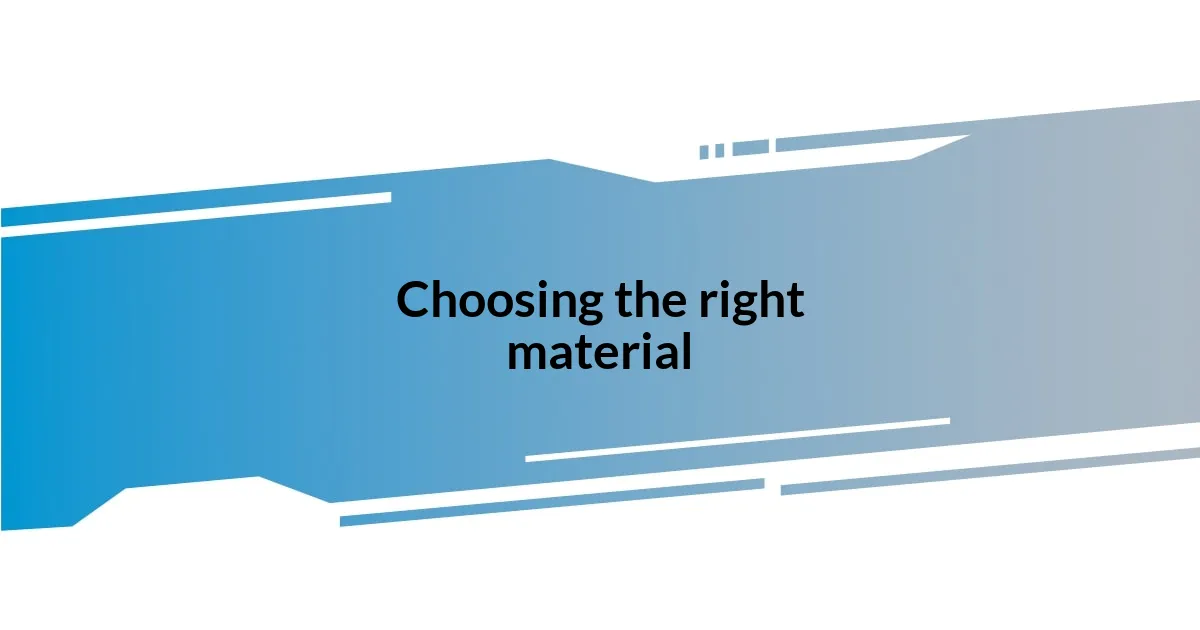
Choosing the right material
Choosing the right material can feel overwhelming, but I’ve learned it’s crucial for setting the tone of your entire audition. I remember sifting through countless pieces, trying to find one that genuinely resonated with me. When I finally chose a monologue that reflected my own experiences, it was like a light bulb went off. I felt alive on stage! Have you ever picked something simply because it was popular, only to find it didn’t connect with you? I’ve been there too, and it made me realize that authenticity is key.
Beyond personal connection, the material should also showcase your range as an actor. One time, I performed a piece that fluctuated between humor and deep emotionality, and it pushed me in ways I hadn’t expected. I discovered new dimensions of my capabilities. The right piece not only highlights your strengths but also challenges you to explore areas you might not be comfortable in. Have you ever tried something that scared you a bit? Those moments often lead to incredible growth.
Lastly, consider the context of your audition. I once auditioned for a contemporary piece but brought in a classical monologue. The judges were polite, but I sensed that my choice missed the mark. Aligning your material with the specific role or production can make a significant difference. Study the requirements and tailor your selection—not just to fit in, but to shine. It’s that fine balance between being true to yourself and being relevant to what they’re looking for that truly elevates your performance.
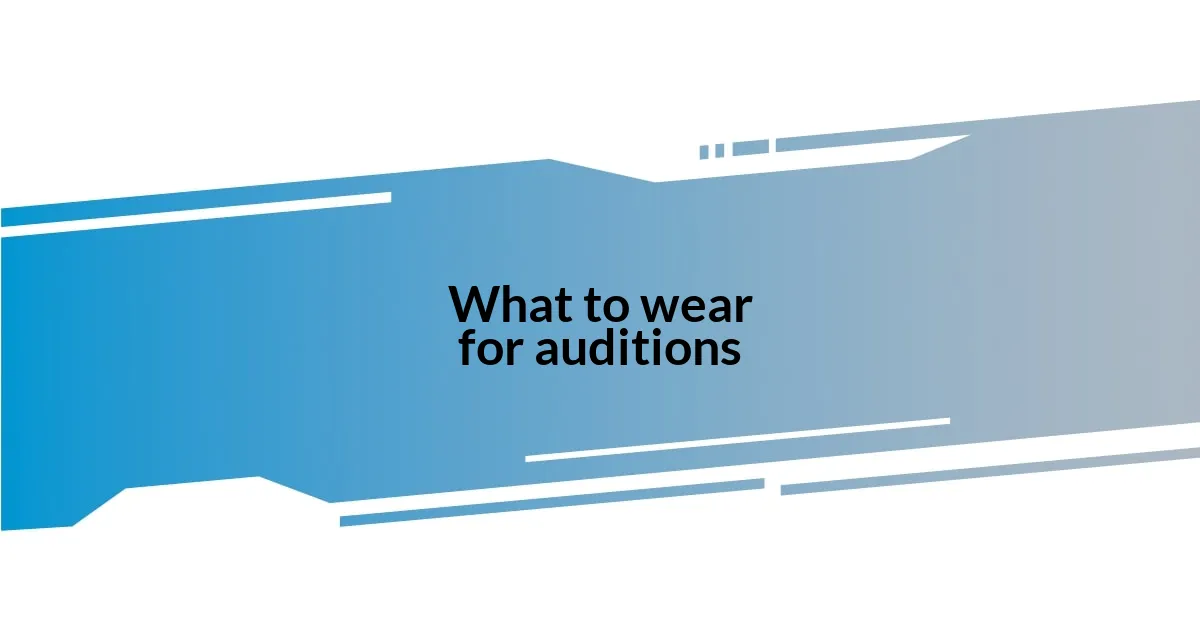
What to wear for auditions
When it comes to choosing what to wear for an audition, I’ve learned that comfort is key. I once showed up in a stunning outfit that I adored but quickly realized it restricted my movement. You want your wardrobe choice to enhance your confidence, not distract you. Ideally, opt for clothing that feels good on your body and allows you to move freely. Have you ever tried performing in something that felt too tight or awkward? It can throw off your focus and impact your performance.
Another important aspect is to align your outfit with the character you’re auditioning for. I recall one particular audition where I wore something that embodied the essence of the role. It was as if I stepped into the character’s shoes before I even began my lines. This approach helps the casting directors visualize you in that role—your outfit can reinforce a sense of authenticity. Think about how certain colors and styles convey specific traits; for instance, bright colors may suggest energy while darker shades can imply seriousness. How does your outfit reflect your character’s personality?
Lastly, remember that less can often be more. I learned this the hard way when I wore accessories that ended up being too flashy and took away from my performance. The goal should be to have the focus on you, not what you’re wearing. Simple and clean looks tend to translate better on stage or in auditions. Imagine walking on stage and feeling completely at ease, knowing your choice supports your performance rather than detracts from it. Wouldn’t that make the experience much more enjoyable?
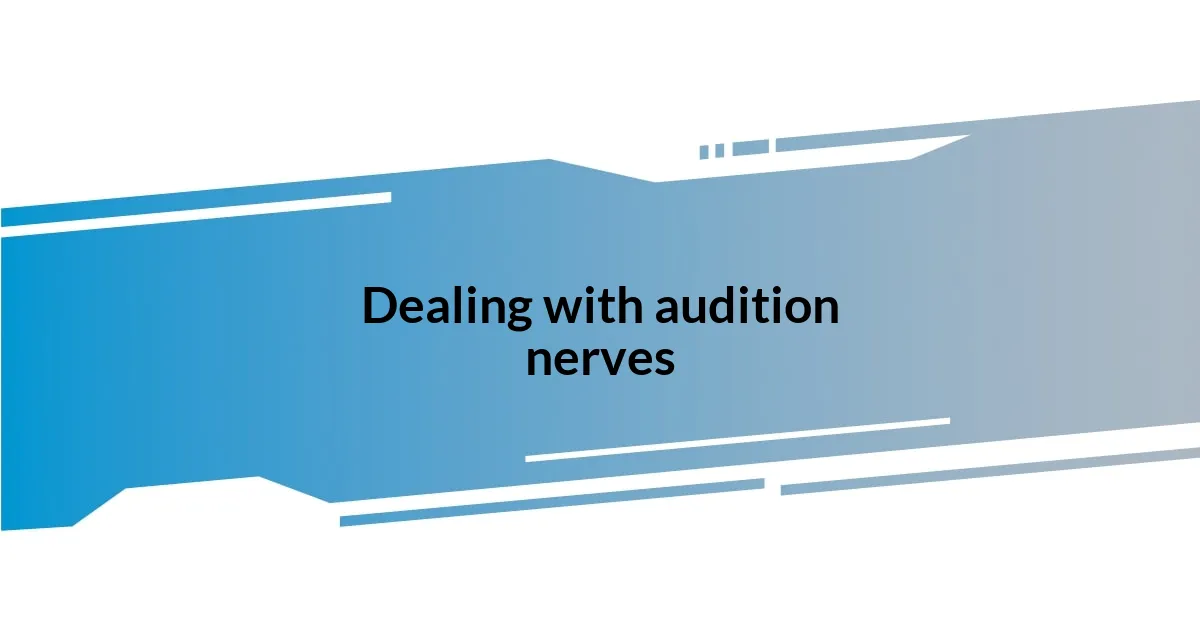
Dealing with audition nerves
I remember my very first audition—it felt like I had butterflies doing acrobatics in my stomach! Nerves can be a double-edged sword. They keep us alert, but they can also steal our focus if we let them. A trick that works for me is deep breathing. Whenever I feel that tension rising, I pause, take a few slow, deep breaths, and envision my performance unfolding successfully. Have you ever tried this? It helps ground me and shift my mindset from panic to excitement.
Another technique that has served me well is visualization. Before an audition, I often close my eyes and mentally walk through my entire performance. I can almost hear the applause and feel the stage lights warming my face. This practice not only builds my confidence but also reinforces a sense of control over my nerves. Have you ever pictured yourself achieving something before it actually happened? That positive imagery can shift the whole experience.
Lastly, I suggest embracing the nerves rather than fighting them. I once performed at a community theater and, instead of letting my anxiousness overwhelm me, I channeled that energy into my character. I found that my nerves fueled my passion and brought a unique intensity to my performance. Trust me, casting directors often look for that spark! So, the next time you feel those jitters, consider it a sign that you care deeply about your craft. What if by accepting this feeling, you could transform it into something powerful?
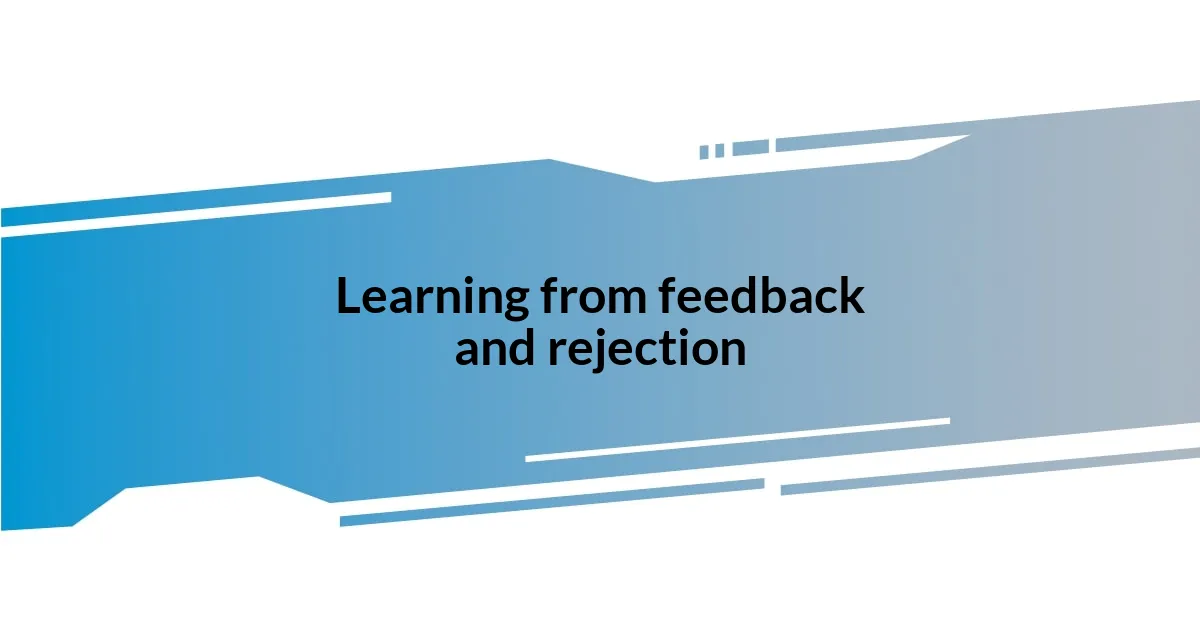
Learning from feedback and rejection
Feedback—whether positive or negative—can feel like a blessing or a curse after an audition. I remember receiving a critique after one of my early performances; at first, it stung, but then I realized it was a gift. I took the advice to heart, spent time reflecting on it, and it genuinely helped shape my next audition. Have you ever considered how rejection can be a stepping stone rather than a setback?
Rejection, though painful, often offers the clearest insights. I once auditioned for a role I believed I was perfect for, yet I didn’t get it. Instead of wallowing in disappointment, I examined what I could improve. I sought guidance from mentors who provided constructive criticism regarding my interpretation. It’s through those tough moments I learned resilience and discovered the importance of ongoing growth. It makes me wonder—what lessons could you draw from your own experiences of rejection?
What I find fascinating is that every “no” can teach you something vital about your artistry. I’ve come to appreciate that feedback is often a reflection of personal taste rather than a definitive judgment of talent. For example, one casting director advised me to take more risks in my portrayal, which opened my eyes to layers of creativity I hadn’t explored. Have you ever experienced feedback that altered your entire perspective? Embracing these insights can be transformative—pushing you to evolve and expand your craft.
